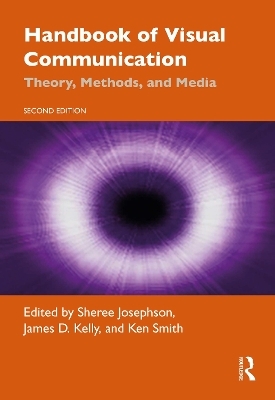
Handbook of Visual Communication
Routledge (Verlag)
978-1-138-59031-1 (ISBN)
The second edition of this already-classic text has been completely revised to reflect the metamorphosis of communication in the last 15 years and the ubiquity of visual communication in our modern mediated lifestyle. Thriteen major theories of communication are defined by the top experts in their fields: perception, cognition, aesthetics, visual rhetoric, semiotics, cultural studies, ethnography, narrative, media aesthetics, digital media, intertextuality, ethics, and visual literacy. Each of these theory chapters is followed by an exemplar study or two in the area, demonstrating the various methods used in visual communication research as well as the research approaches applicable for specific media types.
The Handbook of Visual Communication is a theoretical and methodological handbook for visual communication researchers and a compilation for much of the theoretical background necessary to understand visual communication. It is required reading for scholars, researchers, and advanced students in visual communication, and it will be influential in other disciplines such as advertising, persuasion, and media studies. The volume will also be essential to media practitioners seeking to understand the visual aspects of how audiences use media to contribute to more effective use of each specific medium.
Sheree Josephson is a presidential distinguished professor of communication at Weber State University in Ogden, Utah, where she also serves as department chair. She is an eye-tracking researcher who has published numerous scholarly journal articles, book chapters, and the book Visualizing the web: Evaluating Online Design from a Visual Communication Perspective. James D. Kelly is the director of Journalism at Indiana University Bloomington where he teaches photojournalism and healthcare reporting. He is a former editor of Visual Communication Quarterly and researches the influence of digital imaging technology on news photo credibility and audience understanding of photojournalism ethics. Ken Smith was publisher of the Green River Star in Wyoming prior to receiving his Ph.D. from the University of Utah. He served on the faculty at the Department of Communication & Journalism in the University of Wyoming for 26 years and was head of the department for 15 of those years.
INTRODUCTION Visual Communication Dominates the 21st Century VISUAL PERCEPTION 1. Perception Theory: A Neurological Perspective on Visual Communication 2. Using Eye Tracking to See How Children Read Interactive Storybooks with Supplemental or Incidental Digital Features VISUAL COGNITION 3. Visual Cognition 4. Vsual-Verbal Redundancy and College Choice: Does the Level of Redundancy in Student Recruitment Advertisements Affect High School Students’ Decision-Making Process? AESTHETICS 5. Aesthetics Theory: Aesthetic Experience as a Communicative Tool in the 21st Century 6. Applying Aesthetic Principles to Tell Stories through Photojournalism: Taking a Look Back at my Memorable Images VISUAL RHETORIC 7. Visual Rhetoric: Theory, Method, and Application in the Modern World 8. Trump as Global Spectacle: The Visual Rhetoric of Magazine Covers VISUAL SEMIOTICS 9. Visual Semiotics Theory: Introduction to the Science of Signs 10. Jordanian Banknote Design: A Social Semiotic Analysis 11. The Myth of the American Landscape: Photography and the Semiotics of Nature CULTURAL STUDIES 12. Cultural Studies Theory: The Production and Consumption of Meaning 13. Altering the Body/Altering Communication: Using Cultural Studies Theory to Examine Interactions Related to Body Modification VISUAL ETHNOGRAPHY 14. Visual Ethnography: From Visual to Networked to Multimodal Practice 15. Oppositional Articulations: An Ethnographic Study with Black Artists in Austin, TX VISUAL NARRATIVE 16. Narrative Theory: Visual Storytelling 17. Performing the Past in the Present: Prosperity Junction, Public Memory, and American Identity MEDIA AESTHETICS 18. Applied Media Aesthetics: Encoding and Decoding Meta-Messages 19. Understanding X-ray Images: A Medi(c)a(l) Aesthetics Approach DIGITAL MEDIA 20. Digital Media Theory: From One Way to Multidirectional Communication 21. Google Doodles and Collective Memory-Making 22. Profile Pictures Across Platforms: How Identity Visually Manifests Itself Among Social Media Accounts VISUAL INTERTEXTUALITY 23. Visual Intertextuality Theory: Exploring Political Communication and Visual Intertextuality through Meme Wars 24. What Makes an Internet Meme a Meme? Five Essential Characteristics VISUAL ETHICS 25. Visual Ethics: A Dynamic of Process and Meaning 26. ‘Stolen Valor,’ Moral Panic, and the Ethics of Digital Vigilantism VISUAL LITERACY 27. Visual Literacy Theory: Moving Forward 28. Fakes, Forgery, and Facebook: An Examination of Visual Literacy in the Era of Manipulated Images, Fake News, and Alternative Facts
| Erscheinungsdatum | 30.04.2020 |
|---|---|
| Reihe/Serie | Routledge Communication Series |
| Zusatzinfo | 11 Tables, black and white; 17 Line drawings, black and white; 74 Halftones, black and white; 91 Illustrations, black and white |
| Verlagsort | London |
| Sprache | englisch |
| Maße | 178 x 254 mm |
| Gewicht | 1950 g |
| Themenwelt | Sozialwissenschaften ► Kommunikation / Medien ► Kommunikationswissenschaft |
| Sozialwissenschaften ► Kommunikation / Medien ► Medienwissenschaft | |
| ISBN-10 | 1-138-59031-2 / 1138590312 |
| ISBN-13 | 978-1-138-59031-1 / 9781138590311 |
| Zustand | Neuware |
| Informationen gemäß Produktsicherheitsverordnung (GPSR) | |
| Haben Sie eine Frage zum Produkt? |
aus dem Bereich


